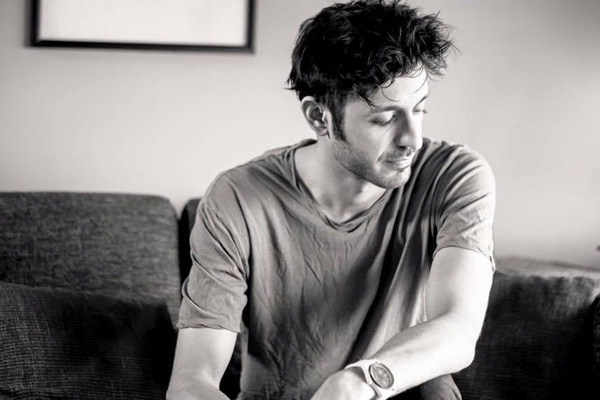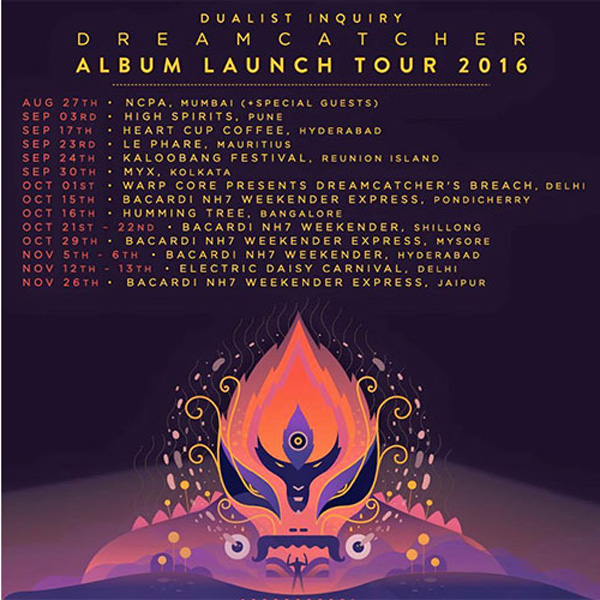For more on radio and music business news. | Click on RNMBiz


MUMBAI: Sahej Bakshi, the Delhi-based producer-composer has become a fixture on the Indian-indie scene since his first LP 'Doppelganger' came out in 2013. The multi-instrumentalist knows how to take you to the electronic music landscape with his rock- influenced alternative tunes. Sahej, best known for his distinct guitar-driven sound and minimalistic beats, has spruced up at the exalted Thornton School of Music, LA. He released his latest album ‘Dreamcatcher’ digitally worldwide on 12 September 2016 on his own record label Dualism Records.
Radioandmusic.com got an opportunity to have a conversation with one of the most inventive electronica rising stars Sahej - also known by his stage name Dualist Inquiry.
Your music is advanced and experimental; how did it begin? Tell us more about it?
When I started making electronic music as a college student, I was just having fun with it and wasn't really aiming for any genre or a particular sound. Somewhere along the way, I started to find stylistic elements and a vibe that I really liked, and it started to come together really effortlessly. Since then, I've been making the kind of music I genuinely would like to listen to, and that's about it.
What does your stage name Dualist Inquiry stand for?
It's a reference to dualism or the existence of extremes within a delicate balance, and to staying curious no matter what (smiles).
How do you motivate yourself before creating such amazing pieces of music?
For me, it starts with clearing my mind and brain of external clamour and getting into a calm, quiet zone. After some time, I start to come up with ideas and melodies which I then develop into complete songs. Most of the songs I write never see the light of day. For example, to select the 12 songs on Dreamcatcher, I went through about 30-35 songs that could have made it to the album.
How would you define your music? The field of electronic is immeasurable, how do you fuse various elements and various styles altogether?
To be honest, I don't really describe my music much, because I enjoy hearing other peoples' take on it. I've heard so many different comparisons, some of which are fairly obvious and others totally unexpected and out of the blue. Taken as a whole, though, I'd say my music belongs in the Indie Electronica genre, which is a very wide term to refer to genre-less electronic music.
It took you quite a long time to release your album ‘Dreamcatcher’...
Yeah, I didn't want to release an album till I felt like I had enough to say. An album is a big deal for any artiste; it sums up who you are at that point in time, and is supposed to represent your best efforts. Finally, about a year ago, I felt ready to go for album #2 and went for it.
Tell us more about Dreamcatcher. What is unique about the sound this time?
The unique thing about the sound is, I just made it and lack objectivity on the matter. When I hear my recent music, I don't think I get to hear it like everyone else. I've been immersed too deep in the material that it all sounds too familiar to me now. Technically, I can say that the quality of recordings has definitely improved, which has led to a fuller and more impactful sound.
Bollywood mainstream music takes the biggest piece of the pie and then comes regional music. How difficult is it for a music producer who incorporates sound for his originals to succeed in this market?
It's quite a challenge, but the good news is that it's possible and within reach for those who have originality in their sound, and drive to keep at it for many years. There are a large number of people who aren't happy with just consuming commercial music, and they form the primary audience for musicians such as myself.
As an electronic music producer, do you feel happy and hopeful about the approach of electronic music and the booming indie scene in India?
Yes, definitely. It's a great time to be a musician in India, and people's interest in indie music is growing immeasurably. Now, we just need to get our small scene to a place where it's legitimised as an actual part of modern Indian culture, rather than being hindered by government policy from time to time.
How and when did you collaborate with Sohrab Nicholson, Josh Fernandez and Kavya Trehan? How tough is it to be collaborating with so many different musicians?
All my collaborations happened organically and without much planning. I'm close friends with all three musicians, and we were just hanging out together when at some point we started writing music. At the time we started writing early versions of these songs, there was no plan for an album, and we were just having fun. It wasn't tough at all; in fact, each of these musicians brought a distinct flavour and vibe with them, which helped me achieve a fresher sound than I would have been able to by myself.
You have performed throughout the nation, which is your favourite venue?
I have to say, the Experimental Theatre at the National Center for Performing Arts in Mumbai is the most breathtaking venue I've ever played in India (Dualist Inquiry’s debuts at NCPA on 27 August 2016).
Dualism Records is a music label started and managed by you, tell us more about it?
I started Dualism Records because of the lack of an infrastructure for independent musicians in this country. I'm still figuring out how to make it most effective before launching some plans we've been working on because I want to get it right and actually help new musicians get wide exposure early in their careers.
Would you like to throw some light on your upcoming projects?
I've collaborated with one of my favourite music video directors Misha Ghose for the first video from Dreamcatcher. It's a song called Violet and is sort of a walk through a few dreams I had. In addition to that, I'm going on tour with a new show called Dreamcatcher Live and will be playing at festivals such as EDC and Bacardi NH7 Weekender. There are lots more on the cards, and we'll keep releasing stuff as we finish it.
Your alternative music outlook defines how influential you've been in the last five years. How do you feel about that?
I think that any healthy scene or industry needs a variety of music and musicians across genres. I'm happy to be a part of a group of such highly motivated and talented indie musicians who are making this scene what it is (smiles).
Check out Dualist Inquiry’s upcoming gigs
